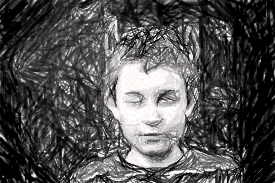Making time for ethical thinking
 Tuesday, November 14, 2017 at 05:09AM
Tuesday, November 14, 2017 at 05:09AM  In Students' Broken Moral Compasses, Paul Barnwell in The Atlantic writes:
In Students' Broken Moral Compasses, Paul Barnwell in The Atlantic writes:
For many American students who have attended a public school at some point since 2002, standardized-test preparation and narrowly defined academic success has been the unstated, but de facto, purpose of their schooling experience. And while school mission statements often reveal a goal of preparing students for a mix of lifelong success, citizenship, college, and careers, the reality is that addressing content standards and test preparation continues to dominate countless schools’s operations and focus.
OK, this is a song that's been sung loudly and frequently. But Barnwell contends that this emphasis on testing has reduced or eliminated the time spent and effort made in teaching ethics and morals, cites studies of the ramifications of this neglect, and argues that empathy is critical in successful people. He concludes:
It’s time for critical reflection about values our schools transmit to children by omission in our curriculum of the essential human challenges of character development, morality, and ethics. Far too often, “we’re sacrificing the humanity of students for potential academic and intellectual gain.”
Barnwell's concern reminded me of Anne Collier's post 6 takeaways from 20 years of Net Safety: Part 2 from last July in which she reflects on Internet safe and ethical use instruction in schools. She observes:
Our safety messaging (in many countries) has to date almost exclusively modeled what Harvard researchers call “consequence thinking” (consequences to self) rather than moral thinking (consequences for known others) and ethical thinking (consequences for unknown others, e.g., one’s community or planet).
I agree that asking students to consider the personal consequence of an action is the most frequent and probably the most time-effective response to a misdeed in school - whether in the physical world or the virtual - at school and at home.
But should we be consciously trying to cultivate moral and ethical thinking, despite the additional time it might take away from teaching to the test? I think so.
If we suspect a student is downloading media without paying for it, what might the response be?
- If you are caught, you might have to pay a fine (Consequence)
- If you don't pay the creator, the creator will have less incentive to produce more work (Moral)
- If you don't honor the intellectual property rights of others, the economy, culture, creativity,etc. will suffer. (Ethical)
The impact of one's action become is more difficult to tie directly to a negative outcome at the moral and ethical levels. And is more time consuming. But it is also deeper, more thoughtful, and more important.
Perhaps all of us need to think less about consequences just to ourselves and more about how actions impact others and the world.









Reader Comments